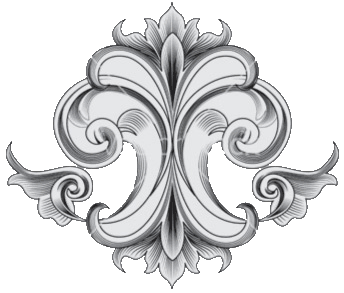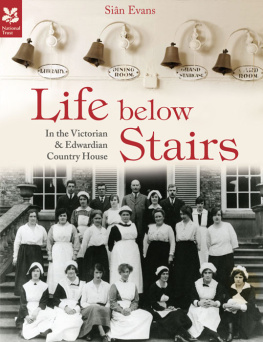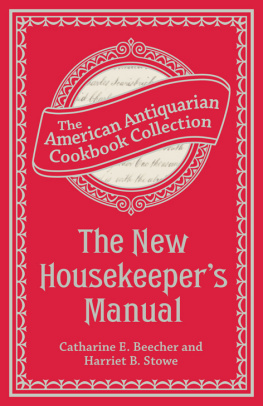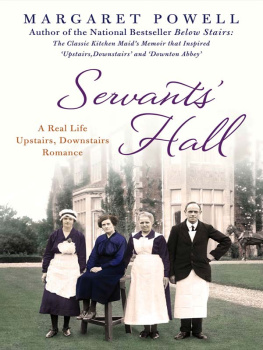Tessa Boase has asserted her moral right to be identified as the Author of this Work in accordance with the Copyright Designs and Patents Act 1988.
This eBook is copyright material and must not be copied, reproduced, transferred, distributed, leased, licensed or publicly performed or used in any way except as specifically permitted in writing by the publishers, as allowed under the terms and conditions under which it was purchased or as strictly permitted by applicable copyright law. Any unauthorised distribution or use of this text may be a direct infringement of the authors and publishers rights, and those responsible may be liable in law accordingly
Prologue

Hatfield House, Hertfordshire 1890
Good housekeepers are not easily got at.
JOHN STRIKE, FORMER HOUSE STEWARD TO LORD SALISBURY, PRIME MINISTER


Housekeeper Wanted
O n Thursday, 16 October 1890, an advertisement appeared in The Times and The Morning Post, London:
HOUSEKEEPER WANTED, for a large, country house. A person is required, of a good address, who has filled a similar position. Write, stating qualifications, to S.N., Mays Advertising offices, 162 Piccadilly, W.
Fifty-nine women read the advertisement, considered their options and replied in slanting copperplate handwriting, stating their particulars.
I am a Protestant, wrote Mrs Phillips, 40, from Lambeth, in quavering black ink, an abstainer, early riser, very methodical, punctual in all duties and judicious in supervision of servants. She was experienced in looking after linen, valuable china and stores, she fully understood cooking with economy and she required wages from 35 a year. That is around 2,100 in todays money. Mrs Catherine Coleman, housekeeper to the Lord Mayor of London at Mansion House, also applied for the job. She prided herself on being a careful and industrious manageress, possessing a large amount of discretion, tact and judicious firmness necessary to control servants. She was educated, tall, of good appearance and address. She was leaving the post because the Lord Mayor elect would be bringing his own housekeeper. From temporary lodgings at Kemp Street, Brighton Mrs Ridout wrote too. Well educated for her station in life, she thoroughly understood the making of all Preserves, Marmalades, Cakes, etc. She had been disengaged at the precarious age of 50, and was hoping something would turn up.
There were replies that appealed to a prospective mistresss vanity, promising to pander to her every need. I shall not consider anything a trouble which will add to the comfort of the household, wrote Mrs Davidson of Mayfair. Kate Corrigan, manageress of the Mosley Hotel in Manchester, understood all the nice little refinements of a well-ordered establishment. Her hotel was about to be pulled down and rebuilt; in any case, she would much prefer a position in a house.
There were replies from career servants seeking to better their position, such as Miss Bessie Kelly, writing from a gentlemans establishment near Warrington, Cheshire. I want to change now to gain more experience. My age is 38. I think I may say I have a very good address & appearance. Mrs Jennings from West Dean Park, Chichester, was disgruntled with her current job as cook-housekeeper, wishing to drop the cook part. I do not like the management of the cooking and its more then I thought it would be, but I took the situation through the wishes of Friends. She had been there less than a year.
The words large, country house acted as a clarion call. This was the top job for a working woman in the nineteenth century. You could do no better, nor live more comfortably or with greater security, and all under your own steam. Uniquely, it was a life that had no need of a manand was far more exhilarating, perhaps, than housekeeping for a husband. The Victorian years were the housekeepers apogee, a time of supreme confidence and expansion for the English country house. She started the century a more subordinate, explicitly feminine figurepickler, preserver, sweet maker, distiller; in charge of all store cupboards and material things, a large bunch of keys clinking at her waist as she checked her housemaids work. She ended the century in a black silk dress, a senior management figure of absolute authority, whose wages might outstrip both cook and butler (at Holkham Hall, Norfolk in 1894 the housekeeper earned 65 a year to the cook and butlers 40).maids and controlling the entire household budget. She remains one of the most caricatured figures of the age.
The housekeeper is invariably one of two types. She is a stern-faced, elderly spinster dressed in blackmeticulous, repressed, asexual, perhaps nursing some secret bitterness. Or else she is a bluff, apple-cheeked Yorkshirewoman, spaniel-like in her devotion. Dickens, himself the grandson of a country-house housekeeper, delighted in the caricaturein Hard Times (1854) there is the ludicrous Mrs Sparsit, a widowed gentlewoman fallen on hard times with a Coriolanian style of nose and dense black eyebrows, her preposterous sights set on marrying her master, Mr Bounderby. In Bleak House (1853) theres her counterpoint: the inoffensive treasure Mrs Rouncewell, a fine old lady, handsome, stately, wonderfully neat, an indispensable part of the grand Dedlock Estate for fifty years. Scotswoman Mrs Hughes of the television drama Downton Abbey (loyal, astute, a spinster by choice) belongs firmly in this second camp.
She was a stereotype to her employers: in 1822 Lady Elizabeth Coke urged her new husband not to engage a gorgon; rather, she wanted a goody sort of person, who will occasionally make up a mess of broth or sago for the poor people. Then there is the most sinister and manipulative of them all: Mrs Danvers, housekeeper of Manderley in Daphne du Mauriers Rebecca (1938). Tall and gaunt, dressed in black, her prominent cheekbones and great, hollow eyes give her a skulls face, parchment-white, set on a skeletons frame.
*
The replies to the Times advertisement of 1890 paint a rather different picture. It was the top job, but it seems to have been a tough job in every sensefrom judicious control of unruly servants, to getting down on your knees with a scrubbing brush yourself. She is not afraid to soil her hands, reads the character reference for a Mrs Adams from Chorlton, Manchester. For all its status, it was a surprisingly insecure job (1890 was a year of sharp financial recession), many women blaming restructuring of establishment for their being let go. It was also a job for the desperate: widowed and orphaned gentlewomen, young and old, down on their luck. Their letters make poignant reading.









